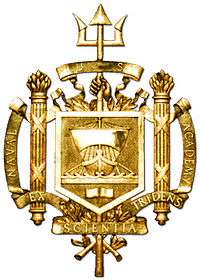Navy–Marine Corps Memorial Stadium
|
| |
| Location |
550 Taylor Avenue Annapolis, Maryland |
|---|---|
| Coordinates | 38°59′06″N 76°30′25″W / 38.985°N 76.507°WCoordinates: 38°59′06″N 76°30′25″W / 38.985°N 76.507°W |
| Owner | United States Navy |
| Operator | U.S. Naval Academy |
| Capacity | 34,000 |
| Record attendance |
38,225 (vs. Air Force, October 5, 2013) |
| Surface |
FieldTurf Revolution (2005–present) Natural grass (1959–2004) |
| Construction | |
| Broke ground | 1958 |
| Opened |
September 26, 1959 57 years ago |
| Renovated | 2004 |
| Construction cost | $3.1 million[1] |
| Architect |
360 Architecture (formerly CDFM2) 2004 renovations |
| Tenants | |
|
Navy Midshipmen (NCAA) (1959–present) Crystal Palace Baltimore (USL-2) (2007) Chesapeake Bayhawks (MLL) (2009–present) Military Bowl (2013–present) | |


Navy-Marine Corps Memorial Stadium is an outdoor athletic stadium in the eastern United States, near the campus of the U.S. Naval Academy in Annapolis, Maryland. Opened 57 years ago in 1959, it is the home field for Navy football and lacrosse, and also the professional Chesapeake Bayhawks of Major League Lacrosse. Since 2013, the stadium has hosted the Military Bowl, a college football bowl game.[2]
The stadium's opener was a 29–2 win over William & Mary on September 26, 1959,[3] and its current seating capacity is 34,000.[4] The attendance record is 38,225, set in 2013 during Navy's 28–10 defeat of Air Force on October 5.[5] The stadium hosted soccer games as part of the 1984 Summer Olympics.[6]
Prior to 1959, Navy played its home games at Thompson Stadium, which seated only 12,000. Its site on campus is now occupied by Lejeune Hall, the venue for USNA water sports.
Memorial
The stadium serves as a memorial to the Navy and Marine Corps; it is dedicated to those who have served (and will serve) as upholders of the traditions and renown of the Navy and Marine Corps of the United States. The thousands of memorial bench-back and wall plaques are a constant reminder, as well as the list of numerous battles involving the Naval and Marine Corps forces since the early 1900s.
Renovation
In 2004 the stadium underwent a major renovation by 360 Architecture. Among the improvements were an expanded press box, 140 club seats and associated club lounge, private suites, new stadium seating (northwest end zone), ADA enhancements, updated restrooms, concessions and stadium operation facilities, new banquet facilities, and renovated locker room facilities.
Playing surface
For its first 46 years, the stadium's playing field was natural grass. Prior to the 2005 football season, the grass field was replaced with FieldTurf, a next-generation infilled synthetic turf. The field runs northwest to southeast, with the pressbox along the southwest sideline,[7] and the elevation of the field is approximately 45 feet (14 m) above sea level.
Jack Stephens Field
The field at Navy–Marine Corps Memorial Stadium is named "Jack Stephens Field", for Jackson T. Stephens (Class of 1947), whose gift aided (1) the renovation of the stadium, (2) the Class of 1947 Legacy project to benefit the Academy's Museum, and (3) other Academy projects.[4]
1984 Summer Olympics
| Date | Time (EDT) |
Team #1 | Result | Team #2 | Round | Attendance |
|---|---|---|---|---|---|---|
| July 29, 1984 | 19.30 | 2–2 | Group A | 29,240 | ||
| July 30, 1984 | 19:00 | 2–1 | Group B | 15,010 | ||
| July 31, 1984 | 19:00 | 1–0 | Group A | 14,508 | ||
| August 1, 1984 | 19:00 | 1–0 | Group B | 20,000 | ||
| August 2, 1984 | 19:00 | 1–1 | Group A | 28,114 | ||
| August 3, 1984 | 19:00 | 2–4 | Group B | 24,430 |
References
- ↑ "Army gives $1107 to Navy stadium". Pittsburgh Post-Gazette. Associated Press. November 19, 1957. p. 27.
- ↑ Patterson, Chip (May 20, 2013). "Military Bowl moving to Annapolis, adds Conference USA for '13". Eye on College Football. CBSSports.com. Retrieved May 21, 2013.
- ↑ "Navy is winner in new stadium". Spokesman-Review. (Spokane, Washington). Associated Press. September 27, 1959. p. 3, sports.
- 1 2 Facilities: Navy-Marine Corps Memorial Stadium. Naval Academy Varsity Athletics official website. Retrieved 2010-02-10.
- ↑ http://scores.espn.go.com/ncf/boxscore?gameId=332782426
- ↑ 1984 Summer Olympics official report. Volume 1. Part 1. pp. 129-31.
- ↑ Aerial image from USGS via Microsoft Research Maps
External links
- Navy Sports.com - official athletics site - Navy – Marine Corps Memorial Stadium
- World Stadiums.com - photo - Navy – Marine Corps Memorial Stadium
- Ballparks.com - NCAA stadiums


